Femia > Health Library > Getting Pregnant > Trying to conceive > PMS vs pregnancy symptoms: How to tell the difference?
PMS vs pregnancy symptoms: How to tell the difference?
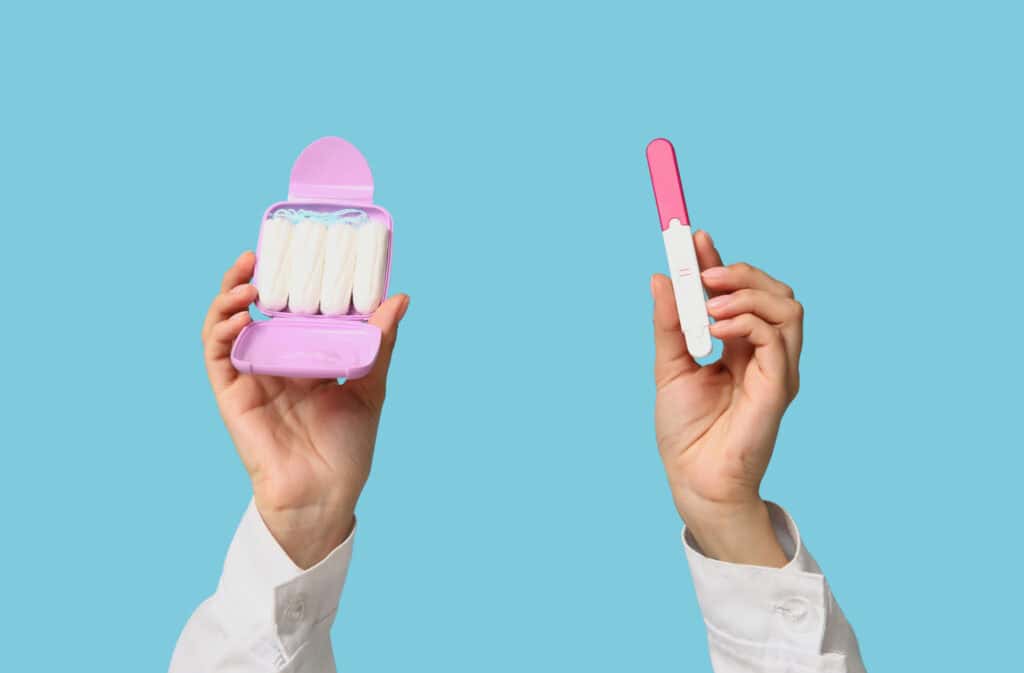
- Updated Mar 2, 2025
- Published
CRAFTED BY HUMAN
Crafted by human At Femia, we provide accurate and up-to-date information at every stage of your journey, from trying to conceive, pregnancy and postnatal support. All content is created by a real person based on in-depth research and own professional experience. Femia ensures that you will receive expert advice, strict accuracy and a personalized approach from our authors/medical experts. Learn more about our editorial policy.
FACT CHECKED
Fact checked At Femia Health, we maintain the highest standards of editorial excellence in delivering content focused on helping you conceive, guiding you through pregnancy, and supporting you postpartum. Explore our content review principles to learn how we ensure the accuracy and quality of our health and lifestyle tips for every stage of your journey.
- PMS vs pregnancy symptoms are often very similar, making it hard to tell them apart.
- Pregnancy symptoms persist after a missed period, may include more intense breast tenderness, fatigue, and nausea.
- The most reliable way to confirm pregnancy is with a test, especially after a missed period.
Feeling the dull ache of cramps, fatigue, and the characteristic changes in your mood will make you expect your period by the week’s end. However, if you have been trying to get pregnant, these symptoms, especially if they are heightened, can make you wonder if you have conceived.
Since both PMS and early pregnancy have similar symptoms, it can often be confusing to distinguish one from the other. However, while subtle, there are a few differences between early pregnancy symptoms and PMS symptoms that can help you distinguish one from the other.
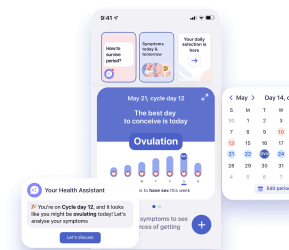
PMS symptoms vs pregnancy symptoms
PMS refers to the distinct physical and mental health changes you may notice in the days before your period. Some women may see a prominence of physical health symptoms, such as bloating, cramps, or fatigue. In comparison, others may notice irritability, anxiety, or symptoms of depression more frequently during PMS. Approximately 23–31% of women say that PMS symptoms affect their daily lives.
With PMS, symptoms vanish within a day or two after your period starts. This is the first difference between symptoms of PMS and pregnancy. Persistent PMS-like symptoms coupled with a missed period should be your first sign that you may have conceived. Along with this, there are a few other indicators that will give you subtle hints of early pregnancy.
👉Find out more: Watery period blood: A sign of pregnancy or health issue?
Breast tenderness before period vs early pregnancy sign
Tender breasts can be noticed both before your period and as an early pregnancy sign. “Tenderness” usually describes the heaviness you feel in your breasts, along with soreness, discomfort in your bra, and increased sensitivity to touch. You may have also felt some lumps in your breast during PMS that vanish within the first week after your period starts.
For both PMS and pregnancy, breast tenderness is due to an elevation in progesterone. Even the lumpy feeling you notice is the enlargement of milk ducts within your breasts. With pregnancy, however, this is more prominent, as your body is preparing for lactation and feeding after delivery. Pregnancy may also cause a darkening of the veins in your breast due to increased blood flow—something that is not frequently seen with PMS.
In a study among Turkish pregnant women, approximately 76% of women reported breast tenderness as a first-trimester symptom, along with nausea, vomiting, and fatigue. For many women, breast tenderness can continue throughout pregnancy, beyond the initial few weeks after you have missed your period.
Is horniness an early sign of pregnancy or period?
With both PMS and pregnancy, there are significant fluctuations in sexual desire because of two factors: your changing hormone levels and the physical and mood changes you experience.
With the slow surge in pregnancy hormones, you may notice a slight increase in sexual desire. However, you may not give in to these desires because of early pregnancy nausea, breast tenderness, and fatigue. Physical symptoms of pregnancy have been observed to decrease sexual desire in the first trimester, which usually picks up in the second trimester when these symptoms are more manageable.
Similarly, sexual desire increases during ovulation due to the brief spike in estrogen. You may have a desire to have sex during your luteal phase, as well. On the other hand, the dominant hormone during PMS is progesterone. Engaging in sex during PMS is influenced by several factors, such as if you live with your partner and the intensity of luteal phase symptoms.
Early pregnancy nausea and fatigue can significantly lower your desire for sex compared to late luteal phase symptoms. However, this depends on when and how intensely your early pregnancy symptoms appear.
👉Find out more: Does ovulation make you horny? Understanding the link between ovulation and libido
Cramping: Period symptoms vs pregnancy symptoms
Cramping is often the tell-tale sign that your period is about to start. Some women may even notice abdominal cramps throughout the premenstrual phase. Often, this cramping is not as severe as you may feel on the first day of your period. It is light, inconsistent cramping in your lower pelvic region that may subside during sleep or exercise.
Cramping as an early sign of pregnancy can have a similar intensity to your period cramps. You may also feel these cramps lasting longer. During implantation, about 10 days after ovulation, you may experience sharp cramps with pinkish discharge, suggesting that a fertilized egg has implanted into your uterus. Following this, you may feel cramping in your lower pelvis, vagina, and sometimes lower back during the first few weeks of pregnancy. This could be “growing pains” as your uterus and ligaments prepare for pregnancy.
The intensity of early pregnancy cramps can be different from the cramps you are used to during PMS. If you have sharp and unbearable pain, it is advisable to consult with your healthcare provider for prompt care.
Fatigue and mood changes: Pregnancy vs PMS
Like all the other symptoms we have discussed so far, fatigue is common with both PMS and early pregnancy. PMS fatigue can be more pronounced, depending on your progesterone surge and if you have other health conditions, such as anemia, worsening your fatigue.
Tiredness in pregnancy is more pronounced in the first trimester, as your body is going through a significant change for your baby. Increased blood volume, your growing uterus, changes in nutritional requirements, and pregnancy nausea can worsen pregnancy fatigue in comparison to your usual PMS fatigue.
PMS mood changes are frequently similar with each cycle. You may feel irritable, notice yourself crying more, or even have sudden outbursts often unrelated to the situation you are in. These mood changes are common—noticed among 48% of women who experience PMS. After your period starts, your mood lightens, and you feel relief from your PMS mood symptoms.
However, with pregnancy, the mood changes could be different from what you normally experience with PMS. Initially, you may not have any usual mood changes; then, you may find consistent fluctuations from days of highs and some lows as your pregnancy progresses. Pregnancy mood changes are different for every woman, with some not having any mood fluctuations throughout their pregnancy.
Nausea and vomiting: Is it only noticed during pregnancy?
About 70–80% of women report nausea and vomiting during their pregnancy. It is frequently one of the first pregnancy symptoms reported, following a missed period, and is caused by the sharp rise in your hCG hormone. Excessive vomiting, known as hyperemesis gravidarum, is characterized by a lot of fluid loss and repeated episodes of vomiting and is a sign requiring medical attention.
On the other hand, while nausea can be present during your luteal phase, it is not a commonly reported PMS symptom. For women who have nausea during PMS, they experience it with almost every cycle. Nausea is caused by the brain’s heightened sensitivity to prostaglandins released during PMS and your period, which is often why you feel nauseous even during your period. PMS nausea is very rarely accompanied by vomiting, which is more commonly observed during early pregnancy.
Are pregnancy and PMS food cravings the same?
You may have noticed cravings regularly during the luteal phase of your menstrual cycle. PMS cravings are not specific but tend to gravitate towards fatty food, chocolates, or ordering from your favorite takeout. These cravings appear in the second half of your cycle, subsiding as soon as your period appears.
Pregnancy cravings, on the other hand, are more specific. They can frequently be bizarre as well, where you may want pickles with your ice cream. Additionally, cravings are also accompanied by pregnancy aversions, where suddenly your favorite foods provoke your puking reflexes. Your heightened sense of smell during pregnancy may be a cause for this.
As with other symptoms, if you notice specific PMS cravings coming in a few weeks before your period, you are likely to be in your luteal phase. Specific changes to your cravings, along with aversions based on recurrent nausea, might be a sign for you to take that pregnancy test.
When should I take a pregnancy test?
Since both PMS and early pregnancy symptoms are relatively the same, it can be difficult to differentiate one from the other. If you feel you are pregnant and notice subtle changes from your usual PMS symptoms, you can take the pregnancy test.
However, early pregnancy tests, before a missed period, frequently give false negative results. If this happens, you can repeat this test a week after you have missed your period, during which it should come back positive if you are pregnant.
👉Find out more: How long after sex does implantation occur: Understanding the timeline
If you have missed your period, and a pregnancy test is negative, consider checking in with your healthcare provider. Blood tests showing your pregnancy hCG levels are more accurate than home pregnancy tests.
Your symptoms may not always be a useful predictor of whether you are pregnant or not. While they could provide subtle clues, they are not accurate, especially because of the overlap of pregnancy vs PMS symptoms. If you feel you have conceived, talk to your healthcare provider as soon as possible, so they can help you start your personalized pregnancy care.

Questions from the Femia community
Can my PMS symptoms suddenly change as a sign of pregnancy?
If you notice specific changes to your PMS symptoms, such as new nausea, episodes of vomiting, pronounced fatigue, or new cravings, it may be worth a shot to take that pregnancy test. New or heightened PMS symptoms could mean something else, sometimes an early sign of pregnancy. To be sure, talk to your healthcare provider about any new symptoms.
I didn’t get my PMS symptoms this time, am I pregnant?
Your PMS symptoms will change during your lifetime. The intensity and severity of your symptoms may also change. So, if you did not get them this time, it may not necessarily mean you are pregnant. However, if you have missed your period and feel you might be pregnant, you can take a pregnancy test to confirm.
Can my PMS symptoms last longer and mimic pregnancy?
Yes, it is possible. If you notice symptoms similar to PMS and have not yet had your period, you might be pregnant. The only way to confirm this is with a pregnancy test. If the test is negative, and you still haven’t got your period, check in with your doctor to find out the possible cause for your delayed period.
I suddenly have food cravings, is it pregnancy or PMS?
It could be either a symptom of pregnancy or PMS. If you have never had cravings before, and you notice specific food cravings (or food aversions), it could be a sign that you are pregnant. However, since PMS symptoms will evolve during your lifetime, this could also be the cause of your new cravings.
The bottom line
Mood changes, fatigue, cravings, cramping, and changes in your sexual desire can be experienced with both PMS and early pregnancy. Most of these physical and mental health changes are also similar, making it difficult to differentiate PMS vs pregnancy symptoms. They may also come around the same time: 10–14 days before your period is due.
However, early pregnancy symptoms have subtle differences from PMS symptoms. The sharp hormone surges, both progesterone and hCG, are responsible for these distinct differences. If you feel you are pregnant, even before you have missed your period, check in with your healthcare provider to confirm pregnancy.
References
- A. Direkvand-Moghadam, et al. “Epidemiology of Premenstrual Syndrome, a Systematic Review and Meta-Analysis Study.” JOURNAL OF CLINICAL AND DIAGNOSTIC RESEARCH, Jan. 2014, https://doi.org/10.7860/jcdr/2014/8024.4021.
- Nazik, Evsen, and Gulsen Eryilmaz. “Incidence of Pregnancy‐related Discomforts and Management Approaches to Relieve Them Among Pregnant Women.” Journal of Clinical Nursing, vol. 23, no. 11–12, Sept. 2013, pp. 1736–50. https://doi.org/10.1111/jocn.12323.
- Fernández-Carrasco, Francisco Javier, et al. “Influence of Pregnancy on Sexual Desire in Pregnant Women and Their Partners: Systematic Review.” Public Health Reviews, vol. 44, Jan. 2024, https://doi.org/10.3389/phrs.2023.1606308.
- Marcinkowska, Urszula M., et al. “Hormonal Underpinnings of the Variation in Sexual Desire, Arousal and Activity Throughout the Menstrual Cycle – a Multifaceted Approach.” The Journal of Sex Research, vol. 60, no. 9, Aug. 2022, pp. 1297–303. https://doi.org/10.1080/00224499.2022.2110558.
- Modzelewski, Stefan, et al. “Premenstrual Syndrome: New Insights into Etiology and Review of Treatment Methods.” Frontiers in Psychiatry, vol. 15, 2024, p. 1363875, https://doi.org/10.3389/fpsyt.2024.1363875.
- Lee, Noel M., and Sumona Saha. “Nausea and Vomiting of Pregnancy.” Gastroenterology Clinics of North America, vol. 40, no. 2, 2011, p. 309, https://doi.org/10.1016/j.gtc.2011.03.009.
- Zhong, Weixia, et al. “Mechanisms of Nausea and Vomiting: Current Knowledge and Recent Advances in Intracellular Emetic Signaling Systems.” International Journal of Molecular Sciences, vol. 22, no. 11, 2020, p. 5797, https://doi.org/10.3390/ijms22115797.
- Orloff, Natalia C., and Julia M. Hormes. “Pickles and Ice Cream! Food Cravings in Pregnancy: Hypotheses, Preliminary Evidence, and Directions for Future Research.” Frontiers in Psychology, vol. 5, 2014, https://doi.org/10.3389/fpsyg.2014.01076.
- Nordin, Steven, et al. “A Longitudinal Descriptive Study of Self-reported Abnormal Smell and Taste Perception in Pregnant Women.” Chemical Senses, vol. 29, no. 5, 2004, pp. 391-402, https://doi.org/10.1093/chemse/bjh040.
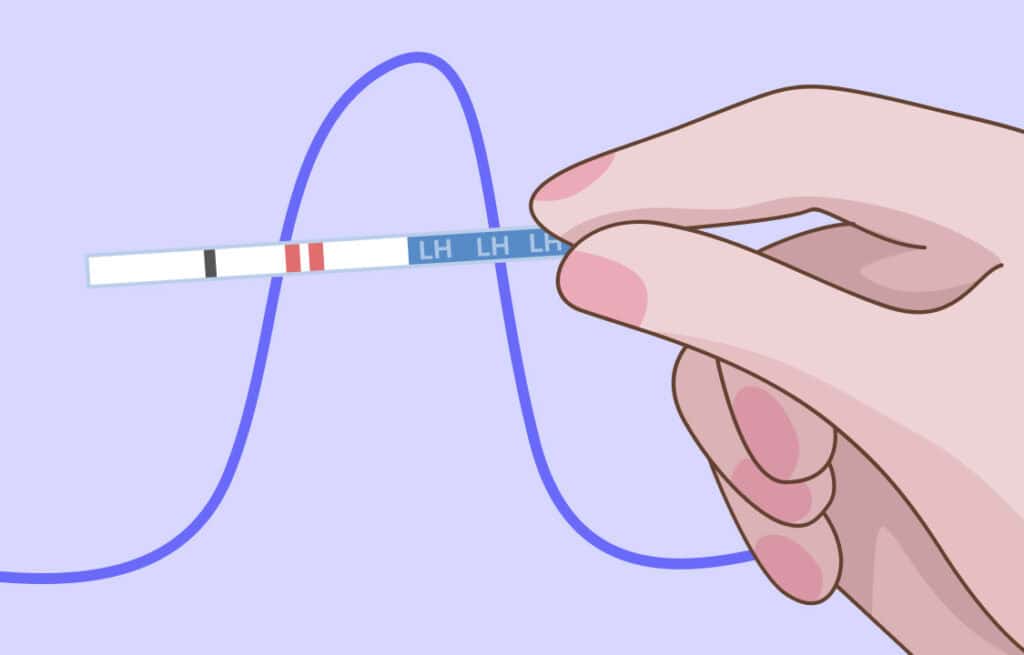
Discover if an ovulation test can detect pregnancy, why you might get a faint positive, and answers to common questions about using ovulation tests during pregnancy.
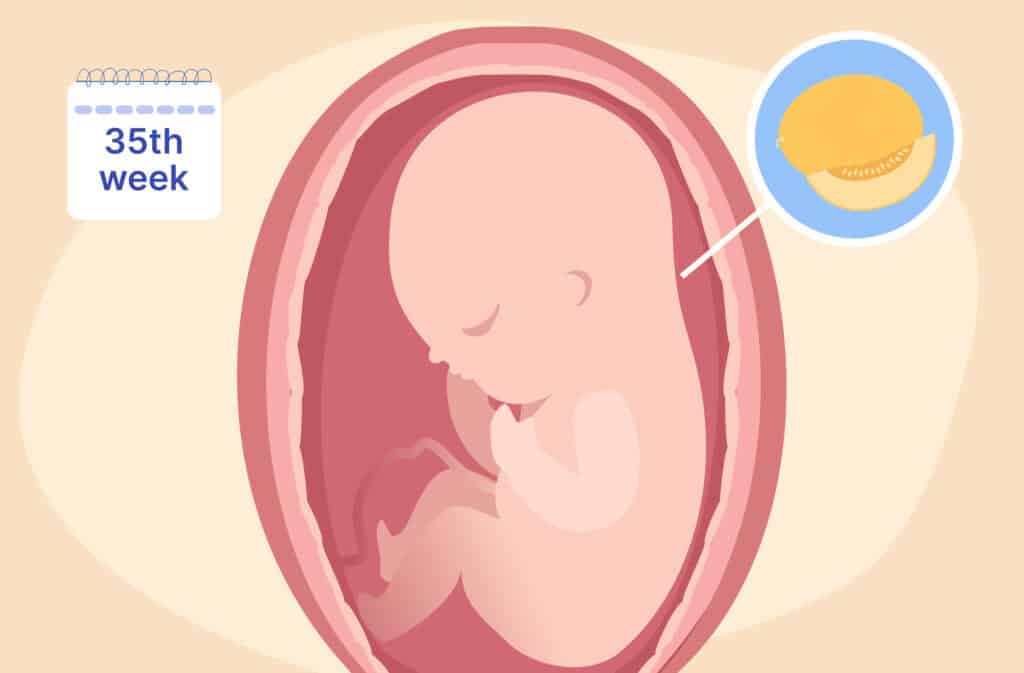
Discover what happens at 35 weeks pregnant, from baby development and symptoms to concerns about sex and breastfeeding benefits.
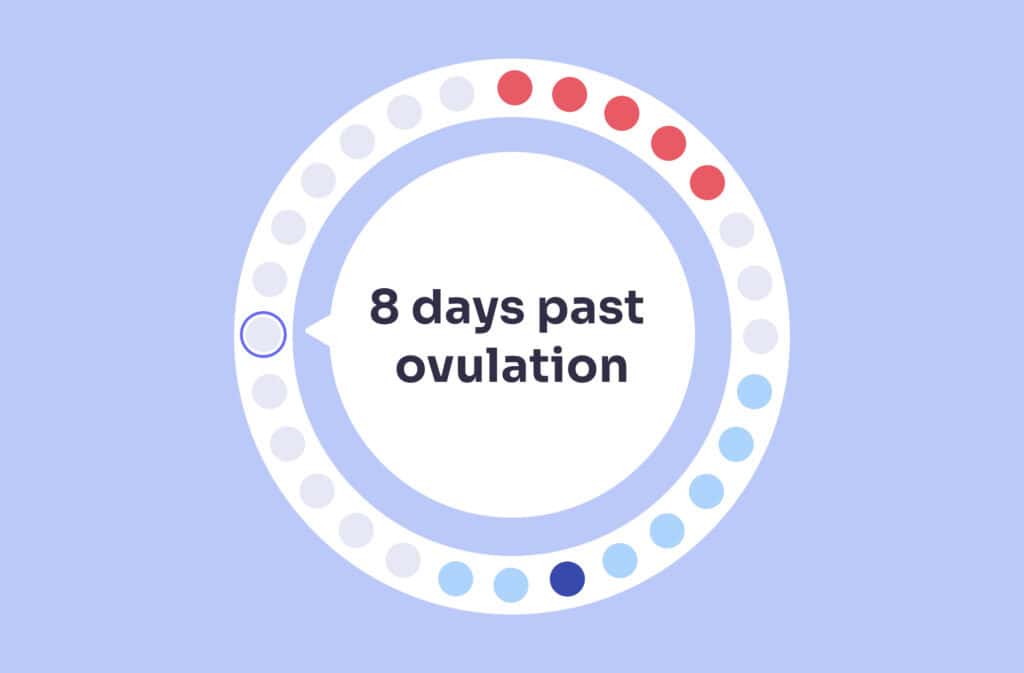
Discover early pregnancy symptoms at 8 days past ovulation (8 DPO), what they might indicate, and when testing for pregnancy becomes more reliable. Expert advice from Femia.

